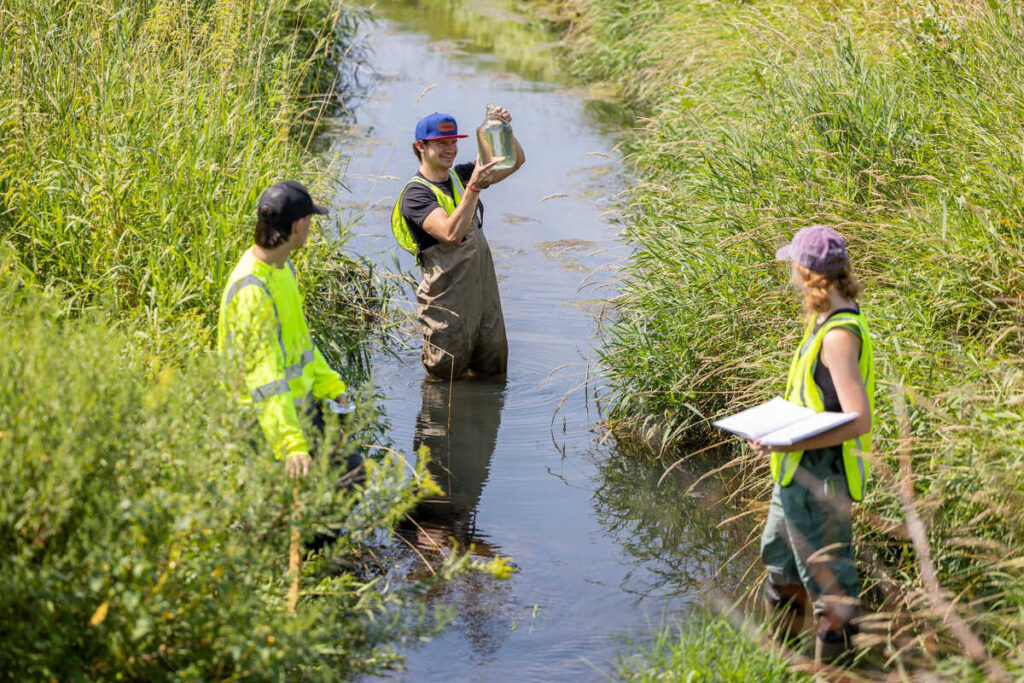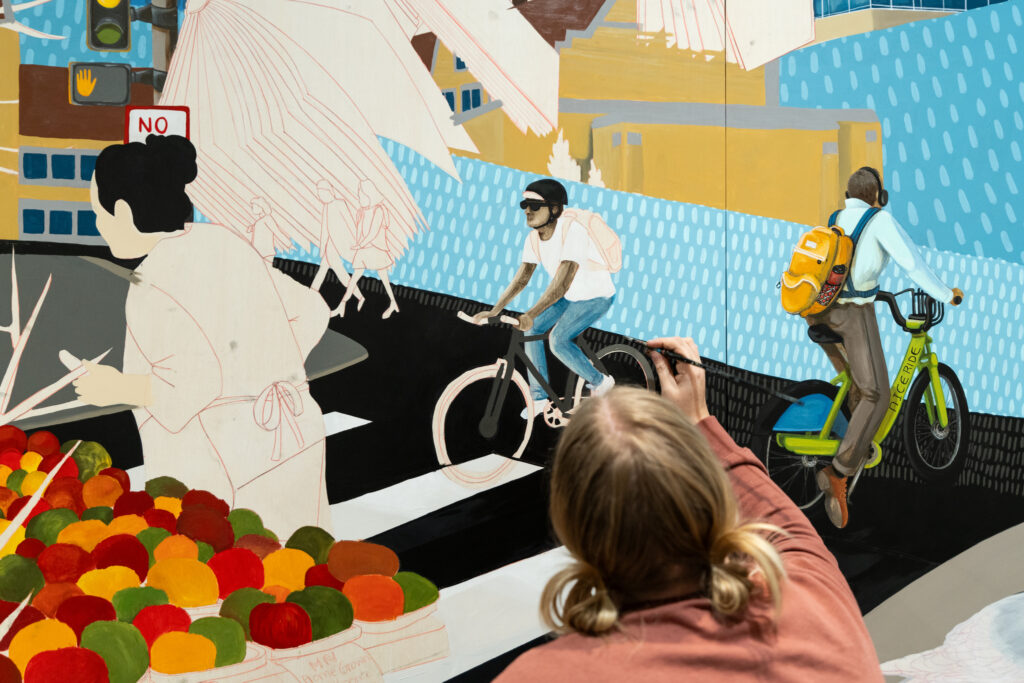The businessman shaking my hand seems worlds away from the grime-encrusted cyclist chugging over jagged roads in distant highlands and the T-shirted social researcher breaking bread (or tortillas, or pistoccu, or...) with centenarians in pocket populations where lives last long. He is worlds away.
Dan Buettner ’83 presents his public face in his public space. His office’s brick wall – requisite at Minneapolis Warehouse District addresses – serves as backdrop to a trio of plaques his and brother, Steve ’89, won for their bicycle treks in the late 1980s and early 1990s. They’re Guinness World Records. Back then the Buettners cycled more than 40,000 miles across the Americas, Africa, Europe and Asia, “personal journeys” that launched Dan’s string of more public expeditions.
With the March debut of his book The Blue Zone: Lessons for Living Longer from the People Who Live the Longest, Buettner is in promoter mode. The Blue Zones project, underwritten by Davisco Foods International, the National Institute on Aging and the National Geographic Society, continues. And a February trip to Greece gave Buettner an injection of expedition energy, relieving his work slate of late from being entirely deskbound and sound-bite packaged.
Influences young and old
“The only reliable way to add years to your life is by emulating the populations that achieve it. There’s no supplement or injection or hormone treatment: It’s optimizing lifestyle,” Buettner preaches, his words resounding credibility per their strapping messenger and his up-to-the-ankles methodology.
Buettner backs his magic-less bullets with data first confirmed statistically and then vividly and vivaciously collected on foot through and in conversation with elders in a quadrangle of “Blue Zones,” or hotspots in which reside concentrations of the world’s longest-living people: Sardinia, Italy; Okinawa, Japan; Loma Linda, Calif., home to a dominant Seventh Day Adventist community; and Costa Rica.
Warming the prescriptive narrative are vignettes of Buettner’s turns with characters like Loma Linda’s Marge Jetton, 103. “Being 101 years old was all right, but last year I started to feel old,” she says. Paragraphs smile off the page as Buettner, 47, recounts tagging along with Jetton to her hair salon, on errands in her Cadillac Seville and to her independent living facility’s exercise room, where the spry old gal bosses around the man who holds world records in endurance cycling. “All the reporters come talk to me because I’m the oldest one here at the complex,” she explains. “They’re always pleasant, but Dan’s an exceptionally nice man.” The feeling is mutual. “You have to kiss a lot of toads to find the Marge Jettons out there, the people who are emblems of their cultures,” says Buettner.
Generations and geographic landforms away, Buettner is, to Cynthia Thomas’ fourth-graders at Oak Hill Elementary in Austin, Texas, a rock star. Thomas’ charges have, since 1995, been among the 12 million students in 80,000 classrooms who’ve journeyed interactively with Buettner on his Quest Network expeditions to exotic locales, rooting out real-time answers to scholarly questions: MayaQuest to the jungles of Mexico and Central America (“Why did the ancient Maya civilization collapse?”), AsiaQuest (“Did Marco Polo really travel China’s Silk Road?”), and GalapagosQuest (“Why is the Galapagos ecosystem threatened?”). Buettner and his experts place themselves at the daily mercy of a junior board of directors: Students’ online votes determine where the team goes, whom they interview and how they budget their resources.
“It’s a big hook for kids, that they get to direct doctors and professionals in solving a mystery,” says Buettner. Peter Miller, expeditions editor at National Geographic magazine, was himself hooked: “Dan was years ahead of the competition in his thinking about interactive expeditions. We’d worked with adventurers before who had filed dispatches or photos from the field. But no one else I knew of was designing adventures from scratch to be interactive experiences for online audiences.”
“The kids are glued to their computer screens!” bubbles Thomas. “Dan’s a terrific friend to educators. Right now, with No Child Left Behind, there are so many yucky things we have to teach and tests, tests, tests. Participating in his quests really gives me motivation.”
For Thomas’ students, Buettner gamely toted a Beanie Baby monkey to China and a replica of Flat Stanley, the paper-thin character of Jeff Brown’s books, to Costa Rica, sending back photos of the tagalongs. Excuse me, but what kind of guy, between leading a dozen scientists and documentarians across China, navigating translations of Mandarin and Uighur, transmitting Internet reports sans satellite dish and squaring off with stewed cow stomach, remembers to prop a Beanie Baby on the Great Wall and snap photos for 22 rapt 10-year-olds back in Texas?
Meet the Buettners
“Dan can relate to a lot of people because he comes from a tight family, and that family quality translates in the field,” says his longtime videographer, Tom Adair of Minneapolis.
Adair was there when, in a remote part of China, Buettner wiled his way behind the handlebars of a rickshaw, demoting its bemused driver to the passenger seat for a lap around town. You can watch the video on YouTube. Adair’s recording light was on in Crete when Buettner talked a 10-year-old gypsy into taking him and the cameraman home to meet the boy’s family, only to find the clan squatting in a dilapidated building, boiling rotten vegetables over butane for their next meal, but nonetheless regaling their western guests with hospitality and music. You can see that on YouTube, too.
“Dan gets his sensitivity and social-ness, that interest in other people and cultures, from me,” declares Marie Jo “Dolly” Buettner ’83, the Roseville mother of four boys (“When they were young, there were times that, oh my God, I wanted a girl!”). “His tenacity comes from his father.” Roger Buettner ’70 M.A. stoked the adventure flame, taking the tyke canoeing and camping in the Boundary Waters and backpacking out West.
“From both of us Dan got his love of education. We’re Tommies!” hurrahs Dolly. (All except Nick, who, in his eldest brother’s words, “got derailed from the righteous road” and went to Augsburg.) Buettner put his mom through college, or so he quips. Parents could take classes tuition-free. Dolly reports him first acknowledging her on campus freshman year when he’d forgotten lunch money. “Then he found out other kids talked to me. By senior year when we had Business Law class together, it was ‘Hey, Ma! Over here! I saved you a seat!’”
The family lived in the Como Park area of St. Paul until moving to Roseville when Buettner was in eighth grade. His maternal grandparents, Angelo and Irene Palermo, remained in the old neighborhood. Work and school schedules landed the teen at their breakfast table every day. “They had an unmitigated belief in me and were endlessly giving, to the extent that their meager means would allow,” says Buettner. “Wanting to make them proud was a powerful but gentle propellant for me in life. There was no pressure to succeed – they seemed proud of whatever I did – so I could do what I loved and they made me want to do it well.”
Angelo bought Dan his first bike. Irene – who, per Dolly, was “quite sporty in her day” – and Buettner remained close until she died in 2000. Buettner dedicated his book Africatrek to his “two beloved Irenes,” the other being his 13-year-old daughter. Buettner also is “Dad” to Danny, 21, a student at the University of Colorado-Boulder, who shares the adventure itch, and Rafael, 10, who, friends say, embodies his father’s emotion and heart. Surely Buettner is the coolest dad in his kids’ circles? “For my 10-year-old, yes,” admits Buettner. “For my 13-year-old, I’ve entered dorkdom. With my 21-year-old, I’m just coming out of being uncool and am cool again.”
Wanderlust instilled and tires inflated, the flip side of exploring – the ability to finance the fun – was similarly foreshadowed early on. (Expedition tabs run in the hundreds of thousands of dollars.) Dolly remembers her eldest selling pears from their fruit tree: “I was mortified. But the neighbors not only bought them, they called back for more!” Next came Star Tribune subscriptions, Buettner’s rabid sales of which won him trips to Hawaii, the Virgin Islands and Spain, and paid his college bills. While at St. Thomas, he took to selling retailers’ space on a discount card aimed at college students. And to forging lifelong bonds.
Of friends and fans and finances
“Dan showed up at The SweatShop 26 years ago, ostensibly to sell me advertising for this card, this business scheme of his,” recalls Gayle Winegar, founder and owner of the St. Paul fitness center and “fierce” Buettner pal ever since. Mission, not money, fuels Buettner’s salesmanship today, she says. “When somebody lays out a vision as well as Dan does, we all want to get on the slipstream and live through his adventures, particularly these CEOs bogged down with responsibility. They get a gleam in their eyes when it comes to being associated with Dan.”
The chase itself is Buettner’s reward, speculates Tom Heuer ’83, Buettner’s friend since sophomore year Spanish class. (Buettner graduated cum laude with Spanish and international business majors.) “Until Dan was about 45, I think he’d received one W2 form his whole life. He’s always worked for himself and made things happen. I think he likes the thrill,” says Heuer.
Buettner nods. “I do exactly what I want in life, what I enjoy. If I’m passionate about it, the money comes. At the end of the day, your success as an explorer – I think Will Steger will tell you this – is how well you can share it with the public and make it something people care about.”
Steger ’66 tells of sitting on a bench at the San Diego Zoo in 1986. A young guy approached and introduced himself, stating that he was en route from Alaska to Argentina on a biking expedition. St. Thomas’ explorer dyad grew ever closer as the years and frontiers stretched on. Though Steger is Buettner’s mentor, the tables sometimes turn, most notably at Café Brenda in Minneapolis in 2002.
“I was struggling and restless, which for me are good signs; it means changes are coming,” recalls Steger of their meeting at Café Brenda in 2002. Buettner invited him on a camel expedition through the Middle East. Steger subsequently had a “pivotal” dream that led him to embark on his global warming series of expeditions: “The tinder was there, but I needed a spark to set the fire,” concluded Steger: “I just caught the spirit of Dan.”
Outside Buettner’s office window, the sun burns high in the sky. The explorer-businessman already has had breakfast with a publishing executive, worked the phones to ABC, NBC and National Geographic regarding his book launch, met with the head of his educational staff, lunched with a health insurance bigwig regarding prospective partnership and responded to a raft of e-mails. That his back is to the window – beyond which wait the great whoosh and wonder of the outdoors – is too apt a metaphor.
After giving a Saturday keynote, he and Heuer will head to Lutsen with their kids. Might they take the backroads in search of a little adventure? He pauses. “That’s harder to find in America. I’m more attracted to parts of the world where you can catch an interesting disease,” he quipped.
Links
Discover how to “Live Longer, Better” at Dan Buettner’s Blue Zones Web site: www.bluezones.com
Learn more about Will Steger’s efforts to address climate change at www.globalwarming101.com
Kitty Shea has been a freelance writer in the Twin Cities for 20 years and an avid cyclist for longer.






